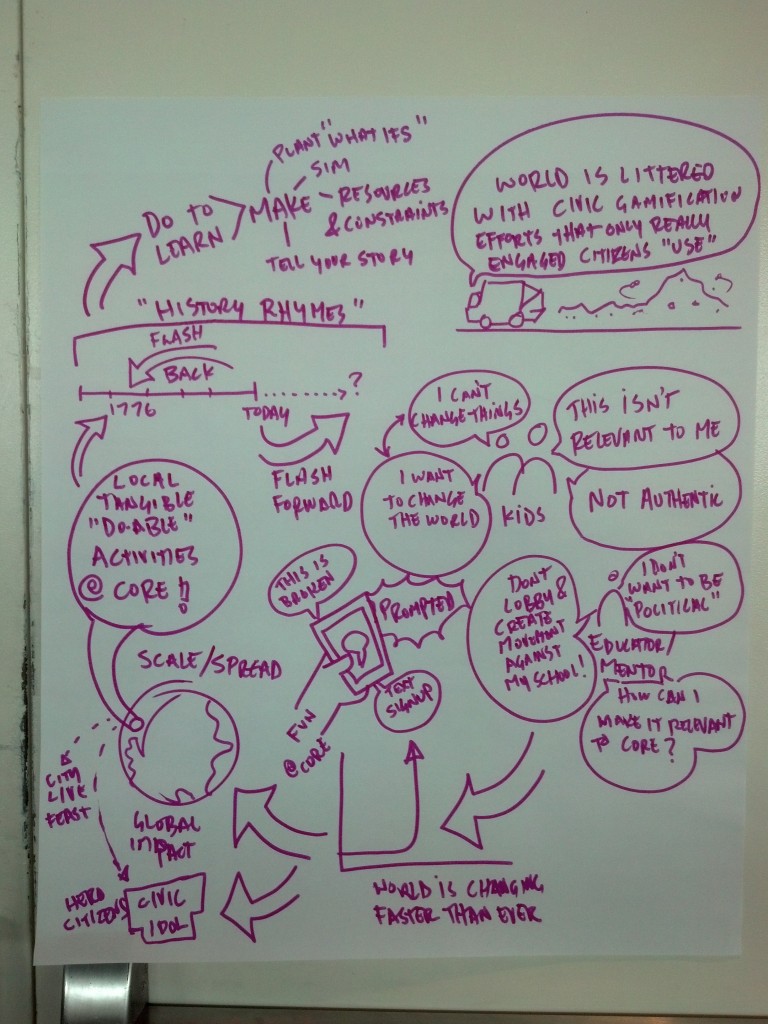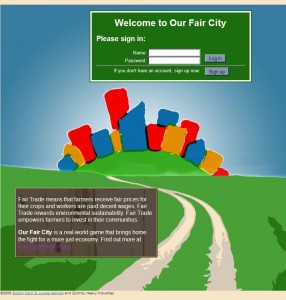At last month’s Reimagining Education event convened by the U.S. Department of Education and the MacArthur Foundation, I led a breakout group that brainstormed a game to encourage civic engagement. We set the following boundaries to direct our thinking:
- It had to target young adolescents (middle school aged)
- It had to be scalable
- … therefore it had to be both accessible and “safe” for teachers in typical school settings, e.g. who may not be well-versed in activism and need to avoid being “political”
- It had to be easily piloted for minimum cost
With these criteria, we quickly coalesced around a range of possibilities, all of which featured the following properties:
- Hyper-local and location-based
- Built around mobile technology
- Lighthearted, preferably fun
- Aiming to demonstrate relevancy and provide immediate efficacy
Out of this, three concepts bubbled up:

Prompted
Two of our ideas had kids documenting the world around them using mobile devices. Inspired by the experiments of Ben Stokes at USC and by the now-mothballed website “This is Broken,” we imagined youth armed with their camera phones taking pictures of things that respond to various prompts, e.g. “This is broken,” or “This could be better,” or “This is great!” The end result would be a civic map of a place from a youth perspective.
The Prompted app would then ping anyone who walked by a location where a picture had been logged. It might prompt a question – “What would you do?” followed by a yes-or-no voting mechanism on possible actions, or a lightweight discussion.
Common Ground
Another take on youth-created civic map was for participants to be able to look through photos taken by peers and begin to, in some fun or gamified way, tag and organize them. The focus would be on helping youth discover ideas or views they have in common as well as seeing other points of view.
Infrastructure
The third concept was a “Civic Mine” that operated more as a set of tools that might, in addition to the ideas already described, also include story builders. What particularly caught our group’s imagination from this concept was being able to “flash forward” into some possible future where a particular problem was solved, or “flash back” into history when a similar problem was previously addressed.
Next Steps
The technology for developing a minimum viable product (MVP) for Prompted and especially Issue Sorter is already in the pockets of most kids today – mobile phones equipped with cameras, plus off-the-shelf systems like Flickr. In fact, an MVP has already been piloted and proven by Games for Change founder Ben Stokes during the course of his work at USC. Adding a geo-prompt or a sorting function would be a fairly simple task.
Indeed, none of the technology presented here is all that challenging. The trick – as with most educational interventions – is to figure out how to get teachers in real schools to use it as part of an ordinary class experience.




 It featured minimal graphics, no sound effects, and deeply flawed gameplay. Yet one of the most important game titles of 2008 was played by thousands and helped change the face of American politics. I’m writing about
It featured minimal graphics, no sound effects, and deeply flawed gameplay. Yet one of the most important game titles of 2008 was played by thousands and helped change the face of American politics. I’m writing about